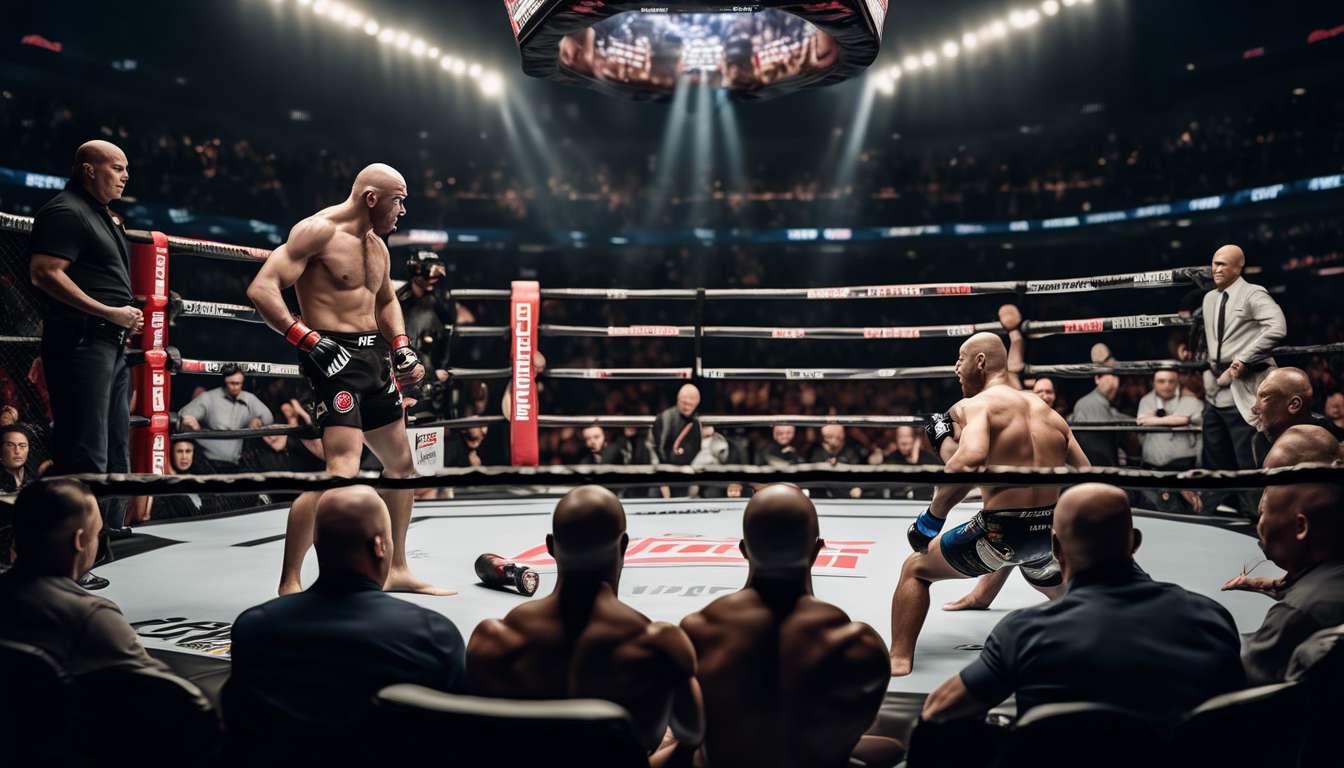Mixed Martial Arts Giants: Bellator vs. UFC
When we delve into the world of mixed martial arts, two names inevitably rise to the forefront: Bellator and UFC. As enthusiasts and followers of this dynamic sport, we often find ourselves comparing these two giants. While both organizations showcase exceptional talent and thrilling fights, their paths and philosophies diverge in several key areas.
Promotion Approaches
-
UFC: Known for its glitz and global reach, the UFC emphasizes high-profile marketing campaigns, star-studded events, and international expansion. Their brand is synonymous with mainstream appeal and extensive media coverage.
-
Bellator: Focuses on innovative tournament formats and often highlights rising stars alongside established fighters. Bellator tends to provide a platform for fighters to grow and showcase their skills in a more grassroots manner.
Fighter Contracts
-
UFC: Typically offers exclusive contracts, which can limit fighters’ ability to compete in other promotions. However, the prestige associated with being a UFC fighter often brings significant exposure and sponsorship opportunities.
-
Bellator: Known for more flexible and fighter-friendly policies, Bellator allows greater freedom for fighters to explore other opportunities, both within and outside the organization.
Event Presentation
-
UFC: Events are characterized by their high production values, often held in large arenas with elaborate set designs and lighting. The UFC experience is designed to be a spectacle on a grand scale.
-
Bellator: Offers a different flavor, often focusing on the fight itself rather than the surrounding pageantry. Bellator events may feature unique settings and formats that appeal to a diverse audience.
By examining these aspects, we can better appreciate the variety and richness they bring to the sport we love. Whether it’s the glitz and global reach of the UFC or the innovative tournament formats and fighter-friendly policies of Bellator, each offers something distinct.
Join us as we navigate through these differences, gaining a clearer understanding of how they shape the landscape of mixed martial arts today.
Promotion Strategies
Both Bellator and UFC employ distinct promotion strategies to captivate their audiences and build their brands. Each organization crafts its unique identity, shaping the way we connect with the fighters and the events.
UFC’s Promotion Strategy:
- UFC operates on a global scale.
- Employs massive marketing campaigns to reach fans worldwide.
- Branding is unmistakable, emphasizing:
- High-profile names
- Electrifying matchups
- Keeps fans on the edge of their seats with exciting events.
Bellator’s Promotion Strategy:
- Focuses on creating a more intimate connection with its audience.
- Highlights personal stories and rivalries.
- Makes fans feel like part of a close-knit community.
- Allows for creative promotion through fighter contracts:
- Fighters engage with fans in unique ways.
- Establishes a loyal fan base connected to both the fighters and the organization.
Understanding Promotion Tactics:
By understanding these promotion tactics, we can appreciate the diverse approaches both organizations use to foster our sense of belonging in the MMA world.
Fighter Contract Variances
In examining fighter contract variances, we find that Bellator and UFC offer contrasting terms that significantly impact fighters’ careers and opportunities.
UFC Contracts:
- Contracts are often more restrictive, tying fighters to long-term deals.
- This can limit fighters’ options for exploring other promotions.
- Provides significant branding opportunities due to the UFC’s global reach.
- Fighters can leverage the promotion’s extensive media presence to build their personal brands.
- May face limitations in pursuing other ventures outside the organization.
Bellator Contracts:
- Tend to be more flexible, allowing fighters greater freedom to explore other opportunities.
- Appeals to those who value the ability to move between different promotions.
- Helps fighters develop their careers on their own terms.
- Might not always provide the same level of exposure as the UFC.
- Offers fighters a chance to craft a career path that aligns more closely with individual goals and aspirations.
These differences highlight the trade-offs that fighters must consider when choosing between the UFC and Bellator, balancing branding opportunities against career flexibility.
Event Atmosphere Contrasts
Event Atmospheres: Bellator vs. UFC
When comparing the event atmospheres of Bellator and UFC, we immediately notice distinct differences in production style and audience engagement.
Bellator Events:
- Often have a more intimate feel.
- Focus on building community among fans.
- Emphasize creating a welcoming environment where fans feel part of a close-knit group.
- Branding highlights fighter stories and personal journeys, fostering a connection with the athletes.
UFC Events:
- Known for grand spectacles with high-energy atmospheres.
- Emphasize scale and intensity to appeal to a global audience.
- Deliver top-tier production quality, featuring:
- Dazzling lights
- Booming sound systems
- Create a larger-than-life experience that keeps fans on the edge of their seats.
Fighter and Fan Appeal:
- Bellator’s contracts may attract fighters seeking a different kind of exposure.
- UFC’s branding power draws in those craving the spotlight.
Both organizations offer unique experiences, catering to different fan desires.
Marketing and Branding Approaches
In examining the marketing and branding approaches of Bellator and UFC, we observe distinct strategies tailored to each organization’s strengths and target audiences.
UFC positions itself as the global leader in mixed martial arts, promoting a brand synonymous with prestige and high-profile events. They leverage extensive marketing campaigns with several key strategies:
- Ensuring their fighters become household names
- Creating a sense of community among fans
- Encouraging fans to proudly wear UFC merchandise
Bellator, conversely, focuses on niche markets and embraces a more grassroots approach. Their promotion strategy often highlights fighter individuality, fostering a sense of connection with the athletes. Bellator’s branding is more intimate, appealing to fans who appreciate:
- The sport’s artistry
- The history of mixed martial arts
When it comes to contracts, the two organizations differ significantly:
-
UFC tends to be more rigid, ensuring fighters align with their brand ethos.
-
Bellator offers more flexible terms, allowing fighters to explore other opportunities. This approach fosters a sense of belonging and freedom within their community.
Fighter Opportunities and Restrictions
In exploring fighter opportunities and restrictions, we find that UFC fighters face more stringent contractual obligations compared to their Bellator counterparts, who enjoy greater flexibility.
UFC Contracts:
- Limit fighters’ ability to seek promotions outside the organization.
- Restrict branding opportunities to what the UFC provides.
This can create a sense of exclusivity but might also limit personal growth and exploration.
On the other hand, Bellator offers a more open approach:
- Allows fighters to explore other promotions.
- Encourages diverse branding ventures.
This flexibility can foster a sense of community and belonging, as fighters are not bound by rigid contracts and can craft their own paths. Bellator’s approach encourages fighters to:
- Engage with fans.
- Develop their personal brands.
- Create opportunities that resonate with their values and desires for connection.
Together, we understand that these differences in contractual obligations and promotion opportunities can significantly impact a fighter’s career trajectory and personal fulfillment in the sport.
Presentation Styles
Presentation Styles: Bellator vs. UFC
UFC’s Approach:
- The UFC is known for its tightly controlled branding, which ensures a polished and uniform appearance.
- Fighters sign contracts with stipulations on brand representation, aligning with UFC’s global promotion strategy.
- This approach fosters a sense of unity and prestige, drawing audiences into a world-class spectacle perceived as the pinnacle of mixed martial arts.
Bellator’s Approach:
- Bellator offers a more personalized experience, allowing fighters greater freedom with their branding.
- This freedom enables fighters to express their individuality, creating a unique connection with fans.
- Bellator’s promotion style often features grand entrances and theatrics, enhancing the entertainment factor and making events feel special.
Conclusion:
Both organizations have their strengths, offering distinct experiences that cater to diverse tastes and preferences. As fans of the sport, we are fortunate to enjoy these contrasting styles.
Global Reach vs. Grassroots Growth
The UFC’s global reach has cemented its status as the leading organization in mixed martial arts, while Bellator focuses on grassroots growth to nurture emerging talent.
UFC’s Global Strategy:
The UFC promotes its brand worldwide by:
- Striking lucrative contracts
- Hosting events in diverse locations
This strategy expands their audience, making fans worldwide feel part of an exciting, united community. The UFC’s global branding approach ensures it remains synonymous with top-tier MMA.
Bellator’s Grassroots Focus:
Bellator emphasizes nurturing local fighters and creating opportunities for them to shine on regional stages. This grassroots focus allows Bellator to:
- Build strong local ties
- Establish a loyal fan base
Their promotion strategies aim to discover and develop raw talent by offering contracts that prioritize growth and career-building. By focusing on community engagement and inclusivity, Bellator cultivates a sense of belonging among fans and fighters alike.
Conclusion:
Together, these approaches reveal how varied strategies in promotion, contracts, and branding shape each organization’s identity and community connections.
Spectacle vs. Sporting Focus
In comparing the UFC and Bellator, we see a clear distinction in how each organization balances spectacle with a focus on the sporting aspects of MMA.
UFC has mastered the art of promotion, creating larger-than-life events that capture the imagination of fans worldwide. Through strategic branding, they’ve built a powerhouse that prioritizes high-profile fights and star-studded lineups. Their contracts often involve big names, ensuring that each event is a spectacle that draws viewers in and keeps them engaged.
Bellator, on the other hand, places a greater emphasis on the sporting element, nurturing emerging talent and focusing on the competition itself. Their branding reflects a commitment to the purity of the sport, with contracts that highlight opportunities for fighters to showcase their skills rather than just their star power.
As fans, we appreciate how both organizations cater to different aspects of our love for MMA. Together, they create a rich tapestry of experiences, welcoming us into a community that celebrates both spectacle and sport.
What is the historical background and origin of both Bellator and UFC?
We’ll delve into the historical background and origin of both Bellator and UFC.
UFC:
- Established in 1993.
- Pioneered the field of Mixed Martial Arts (MMA).
- Aimed to determine the most effective martial art.
Bellator:
- Founded in 2008.
- Sought to provide a platform for emerging talent.
- Focused on showcasing diverse fighting styles.
Both organizations have contributed significantly to the growth and popularity of MMA, each with its unique approach and vision.
How does the pay-per-view model differ between Bellator and UFC?
Pay-Per-View Model Approaches
Bellator and UFC have distinct strategies when it comes to the pay-per-view (PPV) model:
Bellator’s Approach:
- Bellator tends to offer more free events.
- Their PPVs are positioned as exclusive events due to their rarity.
UFC’s Approach:
- UFC relies heavily on PPV sales as a major revenue stream.
- This results in more frequent PPV events.
Impact on Fan Engagement:
- Bellator: The exclusivity of their PPVs can create a sense of anticipation and specialness around these events.
- UFC: The frequent PPV events often feature bigger names, drawing in fans who are eager to see high-profile fights.
Overall, these strategies shape how fans interact with and perceive each promotion.
What weight classes and divisions are unique to Bellator compared to UFC?
Bellator’s Unique Weight Classes
Bellator distinguishes itself from the UFC with its unique weight classes and divisions. This difference provides a fresh dynamic to the sport and offers fighters more opportunities to compete in their ideal weight categories.
Key Differences:
-
Additional Weight Classes: Bellator includes divisions that are not mirrored in the UFC, offering a broader range of competition levels.
-
Opportunities for Fighters: These unique weight classes allow fighters to find a category that best suits their physical and competitive needs, potentially leading to more balanced and exciting matches.
Impact on MMA Landscape:
This aspect of Bellator not only sets it apart from the UFC but also enriches the overall MMA landscape by providing diverse competition formats and enhancing the sport’s appeal to both fighters and fans.
Conclusion
In conclusion, Bellator and UFC showcase unique differences in several key areas:
- Promotion
- Fighter contracts
- Event atmosphere
- Marketing
- Fighter opportunities
- Presentation
- Global reach
- Focus
While both organizations offer exciting fights, they each have their own distinct ways of engaging with fans and athletes.
Bellator is known for its spectacle, often incorporating unique event atmospheres and marketing strategies that appeal to a broad audience.
On the other hand, UFC emphasizes a more sporting focus, prioritizing high-caliber matchups and maintaining a dominant global presence.
Whether you prefer the spectacle of Bellator or the sporting focus of UFC, there is something for every MMA enthusiast to enjoy in the diverse landscape of mixed martial arts.




